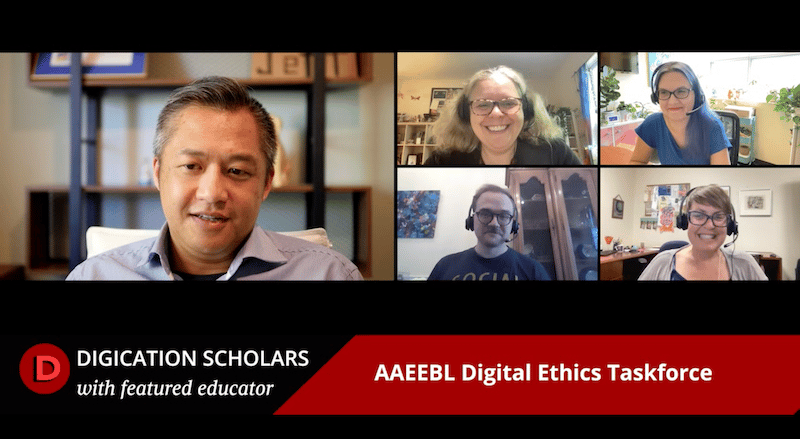Technology is rapidly changing academia, and not everyone is always able to keep pace. What unseen challenges and risks need to be addressed? What are the best ways to do so, and how can these means be adapted to the wide array of backgrounds, contexts, and needs of those in higher education across the globe?
In 2018, The Association for Authentic, Experiential, & Evidence-Based Learning (AAEEBL) realized that there was a need for guiding principles to ground the practices related to ePortfolios and formed a Digital Ethics Task Force comprised of ePortfolio scholars and practitioners to develop guiding principles, strategies, and resources.

We invited four members of the task force to discuss the reasons behind the principles that were developed and how these were designed for the benefit of everyone in the sphere of higher education: Elizabeth Clark, Professor of English at LaGuardia Community College, The City University of New York; Megan Mize, Director of ePortfolios & Digital Initiatives at Old Dominion University; Peter McLellan, Educational Analyst at Oxford College of Emory University; and Sarah Zurhellen, Assistant Director of the Writing Across the Curriculum Program and Professional Consultant in the Writing Center at Appalachian State University.
What Are Digital Ethics (and Why Do They Matter)?
With any new technologies come obvious advantages as well as less-obvious challenges and risks. This is true for ePortfolios and the impact this technology has had on pedagogical approaches, students, and faculty.
"The need for conversation around digital ethics really came from the fact that ePortfolios have come of age and so as they have become more commonplace in colleges and universities as more and more students, faculty, and staff are working with them," said Elizabeth.
“The digital world around us is constantly morphing and evolving, so we need to be attentive to that and attentive to the ways that… new challenges that arise… we want to think about [these] in respect to the various digital ethics and the digital principles."
Sarah noted that the intentional diversity in perspectives (and the content it would produce) would also help individuals from different backgrounds feel more compelled to participate and contribute, which continues the cycle of progressive and inclusive development.
"It evolves because the team evolved, and people are coming in with new perspectives all the time and we benefit from that," said Megan.
The discussion then turned toward certain principles and the situations that they served, as the panel highlighted experiences that planted the seeds that would grow into the set of Digital Ethics principles that the task force developed.
The Practice and Support Principles
Practice: ePortfolio creators need opportunities to develop and practice the digital literacies necessary to create accessible and effective ePortfolios.
Support: Institutions should provide appropriate support for students, educators, administrators, and staff who create ePortfolios.
Sarah highlighted the Practice and Support principles — her job was to help faculty implement ePortfolios in their classrooms and was concerned about how to build that in for students so that it wasn't simply “tacked-on” technology, but that they also understood the pedagogical approach that would help them see how to effectively use that new technology in ways that made sense for their specific context.
It's also important for institutions to provide the appropriate support necessary for everyone involved, whether it’s students, educators, administrators, and staff, which includes providing the necessary resources and professional development required to be able to sufficiently benefit from ePortfolios.
The DEIBD Principle
Diversity, Equity, Inclusion, Belonging, and Decolonization (DEIBD): Educators are aware of equity-related challenges and address learning needs related to each student’s identity, culture, and background as they create ePortfolios.
The panel moves on to discuss the DEIBD principle, and one of the significant challenges this helped to address was the potentially inequitable treatment of student work with respect to what influenced their development.
Many factors can affect how educators perceive student work, and these may not always be appropriate in the context of fairly assessing results because of differing values and perspectives. The DEIBD can provide a framework that can facilitate appropriate adjustments based on the needs of a student and their specific contexts.
"'What is it [that] we're really reviewing and rewarding and prioritizing?' and out of that, I will tell you the calibrations were much tighter, and the top portfolios that started being picked certainly reflected the population. We were dealing… far more accurately instead of privileging people's personal preference for sameness or for familiarity [and] to recognize the rhetorical moves those students were doing and valuing them," said Megan.
The Access to Technology Principle
Access to Technology: Adequate access to technology must be available for all students, and ePortfolio software should be accessible with institutional devices.
The discussion then turns to the unrecognized challenges of unequal access to technology that students can face and the various implications this has for the way institutions and educators should be providing support.
“If you're going to ask students to engage in ePortfolios and other digital kinds of work, then you need to make sure that it's possible… having a device, having a space to work, and having internet — really thinking about what that looks like in a very intentional way,” said Elizabeth.
The panel discusses the fact that there is a real digital divide that affects more people than many in higher education might realize, and this affects students in many ways that aren’t immediately obvious.”
“We have a lot to learn about how to support students who do not have physical access to devices, [the] internet, who do not have knowledge of how to use these digital devices in a sophisticated way,” she said.
The Visibility of Labor Principle
Visibility of Labor: The labor required by students, educators, and administrators to create, develop, implement, support, and evaluate ePortfolios should be visible, sustainable, compensated where appropriate, and counted toward evaluation and advancement.
While discussing the Visibility of Labor principle, a number of key influencing factors were pointed out as being accelerants to digital creep resulting in undervalued and unpaid labor: the pandemic and the lockdowns, the adoption of new technologies resulting in multimodal teaching methods, and so on.
“The acknowledgment and time and space for that work has not [been there], and part of it is [that] technology makes it easy to do things rapidly and makes it easy to do it invisibly,” said Megan.
“A lot of us are doing… more jobs than we did before under the umbrella of our one job, and we really need to talk about that labor, how that labor is supported, and what that looks like on our campuses,” said Elizabeth. “Really making labor visible is so important — who is doing this work? How are they being supported? What does that support look like? Do people have what they need to do their jobs?”
What Can You Do to Get Involved Right Now?
The panelists acknowledged that the vast amount of information may be daunting to those who might want to get involved, and they suggested to simply start with one thing and go from there.
"I would just invite folks who are listening to our conversation today who open up the principles and might feel on their first pass that it's a little overwhelming to take a deep breath and pick one and jump in and think about your relationship to that principle at your institution," said Elizabeth
"Being able to identify just one thing that you can do to work… to improve your teaching and learning… to [give folks] a first step to making those changes because while… justice requires systemic change, giving folks that first step can oftentimes be the most revelatory moment for them," said Peter.
Want to contribute? AAEEBL and The Digital Ethics Task Force would like to invite you to participate in the ePortfolio Mapping Project by filling in this survey.
Dive deeper and learn more about the unexpected challenges that educators faced that influenced the genesis of the principles, the risks of exploitation that were mitigated, and the impact that digital ethics can have on your institution and the systems you work in, and more — listen to the full episode here.
Don’t miss an episode — subscribe to the Digication Scholars Conversations podcast by clicking here.
